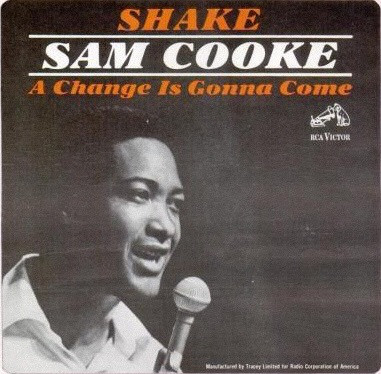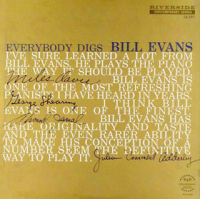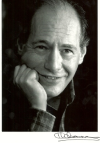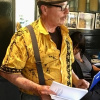.
.

When asked to name the song that best represents their experience with 2020, several participants chose “A Change is Gonna Come,” Sam Cooke’s 1964 recording that became an anthem of the civil rights era. Originally released on Cooke’s album Ain’t That Good News, the 45 version of the song (pictured above) was released as the “B” side to “Shake” on December 2, 1964
.
.
_____
.
.
Dear Readers:
…..2020 has been sad and difficult and infuriating on so many levels. Coping with challenges brought about by a deadly and mismanaged worldwide pandemic, severe economic fallout, horrific and ongoing incidents of racial injustice, climate change disasters, and a dysfunctional political environment — culminating in a bitter election (and post-election) season — has been a continuing, commonly shared struggle. Everyone has had to learn how to best endure these events.
…..I have often turned to music to salve the wounds of this harsh year. My basement office – where the bulk of my living has taken place since March – is well supplied with recordings I have collected over the years, so, when combined with the contemporary convenience of streaming services, the warmth of familiar music is only a stylus or a click away.

Everybody Digs Bill Evans
…..A piece I frequently listened to this year is one that I have found solace in through most of my life, pianist Bill Evans’ 1958 recording of “Peace Piece” from the album Everybody Digs Bill Evans. Its simple beauty is unusually effective in thwarting pain and outrage. It is calming, meditative, centering. Interestingly, it was also a springboard to my seeking out other music that could have a similar effect on me, and along the way helped me discover beautiful work by artists from all over the world.
…..Around the house, my wife has played a wide array of familiar music she too found comfort in. One example is Stevie Wonder’s 1970 recording of “Heaven Help Us All,” which often echoes through our halls. For her, Joan Baez’s 1971 rendition of the song has proven to be especially soul-soothing.
…..The role that music plays in our lives made me curious about other people’s experience with it during 2020, so much so that two weeks ago I invited the community of poets, writers, artists and photographers who have recently contributed their work and time to Jerry Jazz Musician to answer this question:
.
What one song best represents your experience with 2020?
.
…..The song could be of any musical style or genre, recorded in any year. Folks were also invited to write a short poem or paragraph about the song, or about the year itself.
…..What follows are the contributions of 57 creative artists from all over the world, each naming their selection and, in most cases, describing it in a paragraph or two, or in a poem – often written specifically for this feature.
…..Due to the length of this post, biographies of each contributor are limited to their names, their role as contributor to Jerry Jazz Musician, and the city in which they live. By clicking on their name, readers will be taken to a list of posts on which their work has appeared, and where more complete biographies can be found.
…..At the end of each participant’s contribution, readers can click on the song title and be taken to a YouTube link, where a full version of the song may be enjoyed. Additionally, a Spotify playlist that includes all available tracks is embedded at the conclusion of this feature. The result is a “musical quilt” of sorts, a diverse array of meaningful songs that represent passionate personal experiences with 2020.
…..I wish to thank everyone who chose to participate in this exercise – the writers, of course, but also the readers, who I invite to share their own choice in the comments section.
…..I hope you enjoy…and best wishes for better days ahead.
.
Joe Maita
Editor/Publisher
.
.
.
.
_____
.
.
What one song best represents your experience with 2020?
.
.
photo by Tim Davis

Joe Hagan, author; Tivoli, NY
“All Too Soon” by Duke Ellington from Piano Reflections
.
…..This year, on top of everything else, a close friend of mine died of cancer. It happened very quickly, with little time to process. He had been my editor for over a decade, deeply involved in my writing, a collaborator who had given me the confidence to find my own voice. He was also a gifted jazz pianist and music had always been our secret handshake as friends. As he lay in the hospital, I sent him a few songs to listen to on his ear buds. He was in and out of heavy medication and I could never be sure he listened, but I spent hours and hours one evening—as it turned out, his last—trying to think of songs that could convey the gravity of what I wanted to say to him. I tried to imagine a song that could bring comfort but also meaning, bind emotion and art into something like a goodbye and put a fine point on the profundity of life itself. I hoped against hope that a song—a song!—could somehow arrest his pain and eclipse the sorrow of death. This was a tall order — in truth, impossible, even absurd. Later I realized it was probably more for me than for him, a way to cope with the emotions of impending loss.
…..In the end, I sent him a Coleman Hawkins ballad, a Harry Nilsson song, and an Art Tatum-Ben Webster tune—but not the song I had wanted to send. Not this one. Ellington’s “All Too Soon,” I decided, was simply too on the nose—the way the title seemed to acknowledge that my friend was, in fact, about to die, which I knew was true (so did he) but could not bring myself to admit yet. It was too painful. Too soon. He was 62. It wasn’t until I saw him in person the next day that I was able to say a proper goodbye, one of the most profoundly painful experiences of my life. After he died, I played this song over and over again, to experience the emotions of the loss, but also the fragile beauty of life. It was an elegy and a prayer, a communion with my friend, a long goodbye at the edge of darkness.
.
.
.
______________
.
.

Aurora M. Lewis, poet, Moreno Valley, CA
.
My song is Gil-Scott Heron’s “Winter in America.”
…..I discovered Gil-Scott Heron in 1975, I still have his first album, Midnight Band. His Jazz-Poetry spoke to me and I have always thought of him as a genius, ahead of his time. His death was a painful loss, but his music will live on. I have several of his albums and CDs. However, during the year 2020, Winter in America has resonated with me and I have played it more than once during this year. Although released in 1974, it has been winter all year and hopefully, spring will come early, the sun will begin to shine again with the new administration. We are on the right path but, it won’t be easy. Let this be our last “Winter in America.”
.
.
.
______________
.
.

Bob Walters, poet, Asheville, NC
.
That’s easy…”A Change is Gonna Come,” by Sam Cooke
.
.
.
______________
.
.

Patricia Carragon, poet, Brooklyn, NY.
.
…..My song is “The Trapper and the Furrier” by Regina Spektor, a song that predicted the horrors of 2020. Yes, 2020 was a strange, strange year, and more.
.
the trapper & the furrier
……………………….(inspired by regina spektor)
2020 a strange strange year
like a time bomb waiting for breaking news to strike
beasts in filthy cages
pellets and food pets from puppy mills
children sleep in soiled cages
family separation asylum still out of reach
dystopian predictions dystopian facts
big business declares war on its workers
unions wages healthcare live at triage
newspeak from the white house
twists failure into praise fiction into history
our self-proclaimed leader plays mobster roulette
the press elections & laws face execution
he gives carte blanche to an alien dressed as the flu
& the sick keep getting sicker
with too many fevers chills coughs & losses of smell & taste
death toll rising ghost towns replace cities
bodies overflow morgues the homeless live underground
tests & cures not fast enough
business as usual for corporate generals
2020 a strange strange year
people shut indoors waiting not knowing what to believe
their time bombs not knowing when to explode
…………..(originally published in North of Oxford’s The Pandemic Issue #6)
.
.
.
______________
.
.
photo by Curtis Knapp
Ricky Riccardi, author; Toms River, NJ
.
…..In May 1970, with the country still torn apart from the turbulent 1960s, Louis Armstrong recorded his only “message” album, Louis Armstrong and His Friends, featuring arrangements by Oliver Nelson and song choices like “We Shall Overcome,” “Give Peace a Chance,” and a remake of “What a Wonderful World” featuring an emotional new monologue at the top. To celebrate the 50th anniversary, I embarked on a four-part look at the album for the Louis Armstrong House Museum’s “That’s My Home.” I was already living with the music when George Floyd was killed on May 25. The protests that followed coincided with the dates the original album was recorded and all of a sudden, it seemed like Louis Armstrong was speaking to us in 2020, urging to “Give Peace a Chance,” insisting “What a Wonderful World” it would be if we just gave it a chance,” imploring “Love, baby, love, that’s the secret” and finally, after all those years, still promising “We Shall Overcome.” It seemed like the world really hadn’t changed since 1970 and also that Armstrong’s messages were even more timely now. The album never left my rotation during the summer and if I had to pick one song to sum up my experience with 2020, a song that sums up the protests, the pandemic and even politics, it would be “We Shall Overcome.” It’s hard for me to listen to it without bursting into tears and I do believe it’s Armstrong’s last studio masterpiece.
.
.
.
______________
.
.

Paul Perilli, writer; New York, NY
.
…..I just got off the stationary bike we bought to replace at least one part of the gym workout we can’t do these days. These past months I’ve been listening to the long (8:48) version of Curtis Mayfield’s “Move On Up” each time I’m on it. While it might not be an expression of the tragic COVID experience taking place here in New York City, it sure helps to make me forget it for a while. And it is one of the great songs.
.
.
.
______________
.
.

Mary Schmidt Campbell, educator, biographer; Atlanta, GA
.
My song would be “Lean on Me” by Bill Withers.
.
.
.
______________
.
.
photo by Herman Leonard

Gary Giddins, author; New York, NY
.
…..One piece of music that helped remedy this terrible, frightening year? Duke Ellington’s solo piano transcription of his 1943 concerto New World a Comin’, as performed by him in San Francisco’s Grace Cathedral in 1965, as part of his first Sacred Concert. I’ve always loved this performance, but it took on a burnished meaning this year. New World was inspired by the title of Roi Ottley’s prophetic book about Black communities, especially Harlem, and the way they and racial comity might develop after the war. Ellington said that as he composed the piece he visualized a world without war, greed, categorization, and nonbelievers. Another of his 1965 performances of the piece, recorded in England, released early this year, started my quest to hear every version, including one on a rare Italian LP of the Ellington band’s 1955 Carnegie Hall concert (secretly and execrably recorded). The piano version debuted a decade later, and the performance from Grace Cathedral remains definitive. It shows what a uniquely bravura pianist Duke was, finishing with a climax of thrilling dynamics and great feeling; it is perhaps the finest through-composed piano work in jazz.
…..I was delighted to find, a few weeks ago, that I’m hardly alone in my love for this fiercely optimistic, generously melodic (from the first notes), and rhythmically crafty piece: Aaron Diehl recently played it beautifully at a Zoomed recital he gave for the 92nd St. Y.; I hope he records it. You can find a worthy version of the concerto in which Roland Hanna captures Duke’s touch and wit under the baton of Maurice Peress, and an under-rehearsed one conducted by Mercer Ellington with the strangely uncredited pianist Adam Makowicz. But Aaron is the only pianist I have heard tackle the piano transcription, which ought to find a permanent place in the repertory of concert piano. Of course, no one will ever supersede Ellington’s Sacred recital.
.
.
.
______________
.
.

Charles Ingham, artist; San Diego, CA
.
…..In response to the COVID pandemic and our national disease of police brutality, I sought comfort and hope this year in the aching voice of Sam Cooke and “A Change Is Gonna Come.” The song was released fifty-six years ago, and Cooke appears to be in exquisite anguish, vacillating between certainty and despair. “It’s been a long / A long time coming / But I know a change gonna come.” He knows this, or wants to know this, yet “I go to my brother / And I say, brother, help me please / But he winds up knockin’ me / Down on my knees.” By the end of that year, Sam Cooke would be shot dead, having performed the song live only once. Nina Simone writes in her autobiography, “Much as I liked the idea of the world being as one and wanted it to be true, the more I looked around, the more I learned, and the less I thought that it would happen.”
…..I, too, want to be optimistic, and I bow before the street actions of this past year, but, in the end, our cultural reaction to the pandemic and the four-hundred-year-old institutional racism within our law enforcement agencies have left a huge dent in any sense of optimism. Simone wrote “Mississippi Goddam” in one hour on September 15, 1963, after hearing news of the bombing of the 16th Street Baptist Church in Birmingham, in which four Black children attending Bible-study class were killed. In this song, anguish becomes anger, a fury set to deceptively jaunty rhythms: “This is a show tune / But the show hasn’t been written for it yet.” As Simone unflinchingly catalogs each act of injustice, she includes lines that might even be read in part as an uncanny premonition regarding 2020: “This country is full of lies / You’re all gonna die and die like flies / I don’t trust you anymore.” As I write this, two people are dying of COVID every hour in Los Angeles County. But perhaps the show that Simone wishes for has begun to be written this year. It has certainly been a long time coming. These are two of our greatest musicians, and these songs have haunted me this year, two songs that have not necessarily brought comfort; rather, they seem to capture the times in which we are living, that we have lived before, and to which we continue to condemn ourselves. Yet Nina Simone also sings, “Just try to do your very best / Stand up, be counted with all the rest / For everybody knows about Mississippi Goddam.” And always say their names. Denise McNair. Cynthia Wesley. Carole Robertson. Addie Mae Collins. And on.
.
.
.
______________
.
.

Paul Brophy, writer; Baltimore, MD
.
…..My song for this period is Ella Fitzgerald’s “Melancholy Baby.” When she sings this song to me, I feel hugged and comforted.
.
.
.
______________
.
.

Maxine Gordon, author; New York, NY
.
I have chosen “A Change Is Gonna Come,” by Sam Cooke.
…..During these very difficult and troubling months, one thing that we were all able to do was to reflect on our lives and think about what we might do going forward to change the way the world looks at this moment. I was remembering the March on Washington for Jobs and Freedom on Wednesday, August 28, 1963. Anyone who was there will never forget being in that crowd of like-minded people and hearing Dr. King and Mahalia Jackson and being there for that moment when Mahalia Jackson said out loud to Dr King, from behind the podium on the steps of the Lincoln Memorial, “Tell them about the dream, Martin.” And at that moment, Dr. King leaves his prepared notes behind to improvise the entire next section of his speech—the historic section that famously begins “And so even though we face the difficulties of today and tomorrow, I still have a dream. It is a dream deeply rooted in the American dream….”
…..We had so much hope for the future but it is surely a dream deferred. Then on May 25, 2020, George Floyd was killed in Minneapolis by the police and protests broke out and mostly young people took to the streets. This is when I turned to Sam Cooke and “A Change is Gonna Come.” This history of violence and deceit and lies continues to haunt our lives but the work for change continues and there is always the music that we love to inspire us and give us hope.
It’s been a long, a long time coming
But I know a change is gonna come, oh yes it will.
.
.
.
______________
.
.

Maria Golia, author; Cairo, Egypt.
.
…..I love the duet album of Ornette Coleman with Joachim Kuhn, Colors, for how it covers a spectrum of moods and emotions thoughtfully and energetically. Whenever I’m stuck, for one reason or another, it gets me out.
.
“House of Stained Glass” from the album Colors
.
.
______________
.
.

Brian Greene, writer; Durham, NC
.
…..When my daughter Violet was an infant, we found that Gene Clark’s 1974 album No Other could sometimes soothe her when she was in a fit of discomfort. The song “Silver Raven” had a particularly calming effect on her then. Lyrically, “Silver Raven” is hardly a lullaby. But its atmosphere of deep spirituality, along with Clark’s heartfelt, yearning singing, seemed to reach my baby in a way that brought her peace. Violet’s 16 now and going through difficult times, for some of the same reasons a lot of teenagers find life extraordinarily confusing and painful at that stage. As this year that’s brought hardship to so many comes to an end, my biggest wish is that I could simply put Violet in the car, pop No Other into the CD player, play “Silver Raven” and have it make her feel like everything is going to be ok.
.
.
.
______________
.
.

Moe Seager, poet; Paris, France
.
Yusef Lateef…”Love Theme From Spartacus”
.
.
.
______________
.
.

William Minor, poet; Pacific Grove, CA
.
…..I have not just a single song in mind but an entire suite (of film music) I would recommend: Ennio Morricone’s (whose death in July of this year occasioned a deluge of re-attention to his exceptional work). The film is The Mission: a 1986 British drama about Eighteenth-century Spanish Jesuits attempting to protect a remote South American tribe in danger of falling under the rule of pro-slavery Portugal—the film “sad and difficult and infuriating on so many levels” unfolding (the juxtaposition of grace and power, good and evil) for me, too close to events that took place in this country throughout 2020—and the music enhancing the overall effect.
…..There are many versions of the music, but I played my favorite (the most moving I feel) over and over again: Ennio Morricone “Mission” – Concerto di Natale 2012 – Assisi” —to console me for the events of 2020. I have not yet attempted a poem on this experience, but would like, now, to let the music itself speak my feelings: beautiful, inspiring, everlasting: those halls in Assisi.
.
.
.
______________
.
.

Charles Albert, poet; San Jose, CA
.
…..I’ve spent much of the last few months replaying one Brazilian Samba that really speaks to me: “Aguas de Marco” is a hypnotically matter-of-fact list that sounds nonsensical but assembles into a kind of Zen acceptance of the vicissitudes of life. “It’s a beautiful horizon, it’s a fever on Tuesday/It’s the waters of March closing the summer/It’s the promise of life in your heart.” The version with Elis Regina & Tom Jobim is particularly good.
.
.
.
______________
.
.

Bob Hecht, writer; Portland, OR
.
…..The innovative pianist Lennie Tristano was always ahead of his time. Not only did he lay down the first true “free jazz” tracks in 1949 with his sextet, but several years later he recorded an unusual and quite dark solo piano piece that would foreshadow the avant-garde work of Cecil Taylor to follow several years later—though it was not released until 1976, just a couple of years before Tristano’s death. The piece, which contained overdubbed piano tracks, is “Descent into the Maelstrom,” a furious whirlwind of pianistic expression (this is definitely not the so-called “cool jazz” with which Tristano was often linked!), inspired by an Edgar Allen Poe short story of the same name about a man who survives both a shipwreck and a whirlpool. Will we survive the wreckage and whirlpool of 2020, a strange and terrible year that has seen the nadir of democracy amidst the zenith of an uncontrolled pandemic? Only some more time will tell, but I can think of no other jazz piece that so perfectly captures the dark chaos and destruction of this bizarre year.
.
.
.
______________
.
.

Russell duPont, poet, artist; Boston, MA
.
“Lost Life,” by Art Pepper
Lost Life [2020]
….by Russell Dupont
It’s easy to slide into
a breadth of emotions,
into passion and hurt —
twenty / twenty —
the year that burnt
“a black hole into our hearts“ *
how do we reconcile
the haunting beauty
of Pepper’s sax
with the big picture —
Americans divided
and thousands dying daily
Lost, soul-bearing moments
weep slowly, each note
blending with the dark
Life has become tumultuous —
distant and remote —
intense with the anguish
that illuminates deprivation —
yet calls to us to remember
the grace that is humanity.
[*paraphrasing Joe Biden]
.
.
.
______________
.
.

Claire Andreani, poet; Paris, France
.
…..Thank you for your suggestion to write something about a song that means something to us at the end of this strange and troubled year. I instantly thought of the song “Zombie” by The Cranberries. I wrote this poem, reminding me of that song:
.
A million voices resonate
within my head ; they tell
me to do things I would
have never thought of: hold
the hand of a stranger, sing
a song, dance, like it was
the first time, like it was
only me
in the middle of this crowd;
sing my despair, sing my
ruthless hope, what I have
observed, what I haven’t. The
closed expression of children who
don’t play anymore in the metro,
those bright faces that have lost
their tongues and must face half
a humanity, with masks on, eyes
that follow you as you step in
the train. The grayness of a time,
the mourning of a Nation
that has breathed dust for
a year now, the dust of dead
people, victims of a disease,
victims of race
crimes, victims of people’s
lack of heart, like robots.
This year, clouds have
taught me how to look at
them despite the cries,
despite the cries of sirens
weeping silently in the Seine
and…in your head.
.
…..Thank you for this opportunity to express ourselves and to share the lack of joy, the lack of plenitude that becomes a jewel once written.
.
“Zombie“
.
.
______________
.
.

Thomas Brothers, author, educator; Durham, NC
.
…..The song that comes to mind is the Beatles’ “Strawberry Fields Forever.” That song turned on a little light bulb when I first heard it. I’m not sure if I understood it much, since I was very young, but there was some spark. Now, I’ve been a practicing Buddhist for forty years, and I appreciate what I interpret as a view of reality—conventional reality and absolute reality. Conventional reality is nothing to get hung about, and relaxation is the key. That can lead to insight about the nature of absolute reality. There are other songs that represent Buddhism better, but none of them have this one’s spectacular match between lyrics and music—a hallmark of the Beatles.
.
.
.
______________
.
.
photo by Bouna Ndaiye/used by permission of Gerald Horne

Gerald Horne, author, educator; Houston, TX
.
“Haitian Fight Song,” by Charles Mingus – it speaks for itself.
.
.
.
______________
.
.

Susie Gharib, poet; Syria
.
…..George Michael’s “Praying for Time” best represents my experience of 2020. My poem follows.
.
A 2020 Reading of George Michael’s Praying for Time
“This is the year of the hungry man”.
We’re robbed of peace, of livelihood, of light.
No fuel for heating, or to drive a car.
A desolate, war-ridden, benighted land
where international sanctions scurry like frantic rats
on our remaining fertile spots.
“This is the year of the empty hand”
that no one dares to grip with warmth.
Our minds are infested with disease that terrorized
every orifice on our physiognomic façade.
“It’s hard to love,
there’s so much to hate”.
The distrust of nations have closed frontiers
and desperation drives the ones who cling to live
to perilously cross seas only to drown like paper-boats
in the name of hope.
This is the year of the selfish hand
and charity is a coat one parades
as in cat-walk displays,
“So maybe we should all be praying for time”.
.
.
.
.
______________
.
.

Julianne Di Nenna, poet; Switzerland
.
…..Please find here below my submission, a sonnet, for Demi Levato, my daughter’s favorite singer, based on her new song, “Commander in Chief.” The sonnet tells a true story: my daughter, suffering from a life-threatening disease, attended Demi’s concert in Zurich, Switzerland. My nieces hustled my daughter to the foot of the stage at the invitation of Demi’s colleagues, and Demi reached through the crowd to shake my daughter’s hand. I am forever grateful to Demi Levato.
.
Demi Lavato Sings Us Taps
As young doctors labor in hospitals for breath
men play military in the woods, say oh how proud
they are not to wear masks to ward off death
while houses collapse in floods from surging rain and cloud
oh how blessed are we to hear Demi intone a song of Taps
for our lost colors and white stars and red stripes
as masses in America are broken and strapped
fragments of stained-glass among severed ties and burst pipes.
Our Demi, adored, sings for our abandoned spangled banner
how comforting her song, a year ago her hand stretched to a teenage girl
in a wide burgundy wrapped scarf, in quiet manner
whose tiny face gleamed at the base of the stage, a pearl
and Demi touched her hand while the band still played
and shared with her the sweetest of suffering and tender serenade.
.
.
.
.
______________
.
.

Frank de Canio, poet; Union City, NJ
.
…..I can’t think of a song for any season like “You’ll Never Walk Alone” by Rodgers and Hammerstein.
.
.
.
______________
.
.

Howard Mandel, jazz journalist; Chicago, IL
.
…..Thelonious Monk’s “Oska T” — a clunky riff repeated thrice (12 bars) and graceful pirouette in answer (four), then do it again: My song of 2020. Debuted in the 1963 concert at Philharmonic Hall, NYC conducted by Hall Overton and issued as Monk Big Band and Quartet, the complete 13-minute performance is restored on the album currently available, with full discursive solos by Thad Jones (on cornet) and Phil Woods (alto). But I’m used to the 9-minute edit on the 1964 LP, because as I conceive of it the repetition and concision are everything.
…..That simple lick, over and over and over, followed by a light-stepping, utterly unexpected turnaround. Composed when modal jazz and minimalism were trending, it’s superficially static, might seem nagging, obsessive, an earworm with a wisecrack — but hear Frankie Dunlap tap-dance on his traps. The orchestra’s colors swell, Overton keeping that in hand. Charlie Rouse grasps the theme slowly then more surely, probing the few notes, testing their ties. Monk has known all along that limits imply possibilities, as he proves on piano. Is it thus for us at home? Constrained by virus, legacy, habit, but breakout available? I love playing the theme on my synthesizer, the timbral potential infinite, “Oska T.” sounding sweet to me, piquant and mischievous as a nursery rhyme escaping from a music box. Let’s be kids, playing our way out of trouble. But seriously.
.
“Oska T.“
.
.
______________
.
.

Ed Werstein, poet; Milwaukee, WI
.
…..Ellington’s “In My Solitude” has been haunting me lately, and I wrote a poem about it recently.
.
In My (COVID) Solitude
In retirement separation
from my still-teaching lover,
now in a more dangerous classroom,
from my grandchildren,
their mother on healthcare front lines,
alone,
I listen to moody tunes
by Strayhorn and Ellington,
to the Duke’s elegant orchestra.
I’m alone on the Chelsea Bridge
in a Harlem Nocturne
no Prelude to a Kiss,
In My Solitude.
In my
Mood Indigo.
.
.
.
______________
.
.
CJ Muchhala, poet; Shorewood, WI
.
…..The composition that I find encompasses 2020–everything from pandemic to wildfires to extreme weather to the near-destruction of our political system–is Billy Strayhorn’s “Blood Count.”
My poem imperfectly grasps this incredible piece.
.
Blood Count / Billy Strayhorn
radiation therapy
cancer the victor
lying in wait
a last composition
wrenched from Billy’s soul
a yearning wistful
paean to life
and a requiem
.
.
.
.
______________
.
.
Paul Morris, writer; Portland, OR
.
…..While reading Will Friedwald’s definitive biography, Straighten Up and Fly Right, I’ve been listening to Nat King Cole. The early trio recordings were even more innovative than I knew. And his range of material for his many albums was enormous. His recording of the Ellington standard “Don’t Get Around Much Anymore” is appropriate for this year.
.
“Don’t Get Around Much Anymore“
.
.
______________
.
.

Millicent Borges Accardi, poet; Topanga Canyon, CA
.
…..Here’s my 2020 theme song and a poem…”So What,” by Miles Davis, released August 17, 1959 on Columbia Records.
.
So What
Hurry up, so what, hurry up.
Walk fast, no cracks, no sips of reason
No transgressions of air. Take it forward and play
It as the days go by in isolation
Take the year back, like words, and say stop,
Go, and try to move now.
Don’t stop, wave it forward, take it half
Past half time. Take it now and then take it past
What good used to be.
As you turn and twist, don’t
Pause or praise the sky. The air, is moving
Through your breath like a river into a great
Sea. Skip now, skip anew. Then hop. No one
Can get in your way to the forest. Twist those bread crumbs
As they turn and spin too when you throw them
Into the air. They land.
You stop. Jump at a game pick up hopscotch,
Choose your back and how to watch it. Do it forward.
Just in one, in line, same time, next in and next out
In blue time. Keep pressing forward, be light, be right,
Be chocolate cake.
Be dressed in bright yellah and blessed by fellas.
Be jumpy and light with stolen air, And have a go
at the robbers that come in the night to thieve you
At the door. Don’t stop to think. Just glide up that
Haystack and into the fairy tale. Keep pressing forward
Like a train, pick up your pennies and spin on a dime
To where you want to be. Grab fire and pick up the metal
Jacks before the fall of the rubber ball’s bounce.
And don’t come back til that day when your prince
Comes along like a beanstalk and a giant peach, birthed
Solid and sweet. All out of air like the cool.
.
“So What“
.
.
______________
.
.

Kevin Nichols, writer; Bowling Green, KY
.
“Move Out Of The Way” by Los Chicharrons (2001 FUNK)
.
…..This song has that festive energy of being with my intimate friends that gave me hope to get through 2020. The funk instrumentation reminded me of all the jazz clubs, concerts, and DJ sets that I’ve attended over the years. The reason why? I miss the people and energy of those venues….this song has those vibez. All of us putting on our “kickin’ it” gear, our favorite fragrance, and making sure we had a solid pre-game buzz. The planning and preparation of going to the venue is just as smashing as the scene unfolds. And the conversations that take place, in that, the people (music headz) you meet are there for the same reason you are….to vibe out.
…..At the 1 min. 17 sec. mark the female vocal, “I remember that day, you came my way” comes in with a swallowing whiskey sincerity. Maaaaan….that’s all I needed. Social media gives me your pics….us together gives me you.
.
.
.
______________
.
.

Diane Elayne Dees, poet; Covington, LA
.
…..The song that feels the most “2020” for me is Marmalade’s “Reflections of My Life,” which was written at a time when the country was weary of the war in Vietnam. This year, I’ve had some significant personal challenges, with both the pandemic and the near-collapse of my government looming over them, clouding my perspective. Marmalade’s timeless, heartbreaking, melodically haunting song blends personal and societal grief in a way that speaks for me like nothing else does.
.
.
.
______________
.
.

Alan Yount, poet; Columbia, MO
.
…..I have always been a great fan of the Doobie Brothers. This poem uses a line from the Doobies song, “Listen To The Music.”
.
What The People Really Need, Is A Way To Make Them Smile
………..“Tom Johnston, Doobie Brothers Band.”
…………“What I miss most, is seeing …all the people smile.” … Jerra
in the virus era
now everyone wears
a mask.
*****
with all the college students
returning this fall,
I realized that no one
can really tell
what the gals & guys
look like.
*****
then there is this:
you can’t even see, or hear
if people are singing
a little song
as they walk along …
(maybe saying, I love you so).
*****
with masks on
the people look like
they are cast
in pompeian stone.
*****
we all need to pull together
to find something
fairly soon.
right now it seems
nearly impossible,
but somehow show them
that change is coming.
*****
finally, finally,
make the masks come off:
“that what the people really need
is a way to make them smile.”
***
Postscript: This poem was inspired by the Doobie Brothers song, “Listen To The Music,” from their album Toulouse Street.
………….Originally published by: WestWard Quarterly: Fall issue, 2020.
.
.
.
______________
.
.

Josie Rozell, poet; Honolulu, HI
.
…..Vulnerability this year came in the form of changing plans, adjusting to inevitable situations, redefining life for an indefinite amount of time. How terribly difficult to realize I have always underappreciated full control. Through this vulnerability, I have shied away from committing to any which way in order to spare the disappointment—that leads to a bland mood, bland attitude, blandly marking days off a wall calendar.
…..But then you have Yazz Ahmed.
…..Who proclaims herself on trumpet in “Jamil Jamal.” Something so definite always lands a kick in the pants to my quiet desperation. She shakes me by the shoulders saying, listen! Listen and enjoy the feeling of power!
.
Wah-Wah Sowahwah
What that woman can do with a trumpet!
They say
teach a man to catch a fish
but I say
give a girl a trumpet!
……………..She’ll wail forth the inner animus,
……………..one long wondrous roar against the willows
……………..she’ll slash long marks in the manicured lawn
……………..with glinting brass she’ll rattle and roar
open the windows
unlock that door
she’s roaring tonight!
……………..finger cymbals clang!
……………..the hips of desert nomads swing
……………..that trumpet drives the clocking circles
the open air hears you and raises,
the wind is gusting that roar
to the heavens!
.
.
.
______________
.
.

Carrie Magness Radna, poet; New York, NY
.
…..2020 was a backwards year, we were all hibernating. My chorus was on hiatus; my singing was on hiatus.
…..I didn’t listen to much music in March-August; my musical heart was broken. (My poetry side, on the other side, was never better…I wrote 50 poems, and published 20-30 of them.)
…..In August 2020, a month after the NYPL libraries opened up for business again, the movie The Last Days of Disco (written by Whit Stillman) was playing on Showtime, and the disco music in that film was so uplifting; I started to smile again, and I would sing along and dance with the music. I was really young when disco was big in the ’70s. It was food for the soul; it was exciting, I wanted to dance on the lit floors so much. So, the film took me back; it was pure, instant joy to me.
…..I just recently saw the HBO documentary: The Bee Gees: How can you mend a broken heart. (It’s excellent; please see it if you haven’t already). Anyway, the Gibb Brothers wrote a song called “Jive Talkin'” (1974).
…..This reminds me of 2020–the jive talkers, who said COVID-19 was a hoax, the people who refused to wear masks, the President who lied, got sick, and wouldn’t concede the election…
…..And, “Jive Talkin'” does make us want to dance and sing, in these tough times.
.
.
.
______________
.
.

Erren Kelly, poet; Boston, MA
.
My song choice is Monk’s “Ruby, My Dear”
…..I think the best way to make sense of thelonious monk is don’t. otherwise you will up like some critics who think they know the deal but don’t. monk is like an island, which only a few are ever fortunate enough to discover. he is a musical haven, an oasis in a medium, too often confined by its own limitations. like brubeck, monk doesn’t let himself be a slave to time signatures; most often he defines them. make his own freedom out of conformity. his bandmates often understood this, choosing to let him go along with the flow, that’s not to say they don’t work their magic either, for a group is merely the sum of its parts and every instrumentalist who performed with monk, gave their own colors and tones to his sonic paintings…I have heard much of monk’s music over the last 9 months. he has been a quarantine staple. daily, bright mississippi, greeting me like a faithful friend. thelonious’ use of notes is never gratuitous. he always knows what to say, how much to play and when to play it. monk is also good at knowing what not to play, letting the silences between the notes tell their own vibrant stories. as i’m listening to ruby my dear, i can’t help thinking of someone that should’ve been more to me, but has now become only a memory. Monk may play second to coltrane’s saxophone, but both convey the misery of lost love. and sometimes, monk reminds me of an old man on roller skates, he just takes the music, manipulates it, and almost looks as if he’s gonna fall, but somehow, manages to catch himself and rights himself up again…It is for these reasons, i’ll never stop listening to thelonious, never tiring of the roller coaster ride…
.
.
.
______________
.
.

Michael L. Newell, poet; Southeast Florida
.
…..“Christmas in the Trenches” is a folk song by John McCutcheon (accompanied by Trapezoid) that I have loved since discovering it in the early 1980s. It is one of the most hopeful songs in the midst of horror that I can think of.
.
.
.
______________
.
.

Kathryn MacDonald, poet; Belleville, Ontario
.
…..It may be the slow descent of our moods through the pandemic year, but I found myself, by fall, turning to Coltrane for Lovers, especially the yearning vibrating through the currents of “My One and Only Love.” We could chalk it up to the wild ride that Covid-19 has taken us on: social distancing, the yearning not only for love but for the serenity missing throughout this pandemic year. So, I’ve taken up the challenge and drafted a poem paying homage to that song, to Coltrane and Hartman, and also to Ella Fitzgerald’s rendition, which I love. I’m afraid I’ve written an elegy, but there you have it.
.
The Swing
The swing hangs from a branch
of an old maple tree
gnarled by weather and seasons.
……………She lifts up
………………………………..down
……………………………………..up again
……………swinging like a song on the wings of spring
……………giving herself to Ella in sweet surrender
……………giving herself to allegorical spring.
By autumn notes slip lower
…………………………………………….slower
…………………………………………………..deeper
……………follow Johnny Hartman’s baritone
……………Coltrane’s tenor sax, Tyner, Garrison, Jones.
By winter, she no longer swings
her hands clutch the frayed rope
her feet drag through fine silt.
For too many the music has stopped.
.
.
.
______________
.
.

K. Roberts, poet; U.S.A.
.
…..My choice for a 2020 inspiration:
…..It isn’t one song but the musical “Hamilton,” which had largely passed me by until the Broadway performance was streamed in July. Watching it has challenged me to reach a little higher in my own writing goals. Individually and as a group, the cast is abundantly talented and continually productive, so it’s been an ongoing source of pleasure learning about their other projects. This song would probably work best for you: “It’s Quiet Uptown.” It’s a very sad ballad, but then it’s been a sad year.
.
.
.
.
______________
.
.

Victor Enns, poet; Gimli, Manitoba, Canada
.
…..My song for 2020 is “Washing of the Water” by Peter Gabriel, played by the Jodi Proznik Quartet. The hymn-like arrangement by Tilden Webb is a tribute to Oscar Peterson and will soothe your soul.
…..This is a new poem of mine…
.
There Is Too Much Death
Time does not care whether it’s Covid-19
Or covert militias that kill, funerals
Now just a memory, hoping to see
Your grandmother through the glass
Before she breathes her last. Families
Are repulsed by the line-up of refrigerator
Trucks for racking the dead, the living left
With no place to take their viral remains
The cemeteries full to bursting,
Not deep enough to take all this mortality
And no hell hot enough for the unmasked
Needing beds to die in all the same.
Health care workers pay no mind
Whether you walk on the sunny or the dark
Side of the street with the shady National police
In rental vans for the still breathing
As if it was possible to take away reality
Captured on every phone rolling digital
Video, death Is no secret. We can see it all in slo-mo
All those guns, all those aerosols, all those bodies.
At home I do not pray, I live in another country
Afraid of all the violence; there is too much death
So close to where I live. I shelter in my apartment listen
Here to jazz hymns, like Haden, like Peterson,
here Webb’s arrangement takes pain,
washing it in the water, brings solace
To the river, the one we all will cross
.
.
.
______________
.
.

Phil Linz, poet; Wilmington, DE
.
Arlo Sings Elvis
I go back to this video often, when
I need a hit of change, and hope
When I need a laugh, too
It’s about what may yet be possible
Even in 1989, even in 2021
The power & joy & connection, all singing
“An old Elvis tune, somewhere in Europe”
The dark days of this dark year ending, finally
The loser will leave the White House, he will
And no, it won’t be all sweetness & light
But it has to be better, it must be better, it will be
A leader who’ll read his daily briefings,
A leader who cares for science, on virus, on climate
Hope and change, redux, 2.0: 2021.
.
“I Can’t Help Falling in Love With You“
.
.
______________
.
.

Carol Friedman, photographer; New York, NY
.
…..“Don’t Explain” is the last track on Jimmy Heath’s album, Love Letter. I find myself returning to this tune again and again during these disconcerting times.
…..As Reverend Dr. James A. Forbes aptly stated, “It’s an elixir for the soul.” And it’s the perfect distillation of the jazz form, as far as master musicians listening to one another with utmost precision and respect—in particular Kenny Barron and Mr. Heath. Jimmy passed away, at 93, only two months after making this recording —his last word. Perhaps because I had the privilege of being in the booth with him when he played this song, it brings me great solace.
.
.
.
______________
.
.

Dan Morey, writer; Erie, PA
.
…..I was okay with not going to movies and restaurants, but when international travel shut down I really started to resent this pandemic. I’m supposed to be in Japan right now, down Beppu way, soaking in an onsen and sipping sake. Instead, I find myself in Pennsylvania’s rustbelt, staring out a window, wondering how it’s scientifically possible for rain to turn to sleet, then hail, then snow, then back to rain again, all in less than half an hour.
…..Fortunately, there are other ways to travel. If you’d like to escape to the Far East, with a layover in Latin America, just listen to “Puffy de Rumba” by Japan’s genre-hopping pop duo, PUFFY (Ami Onuki and Yumi Yoshimura). The claves, Spanish piano and swooping strings give the song a retro Cubano flair, while the Japanese vocals (peppered with Prado-esque ejaculations of “Rumba!” and “Ooh!”) are pure PUFFY—infectious and thoroughly delightful.
…..PUFFY is guaranteed to alleviate any symptoms of depression, rage, or frustration you might be experiencing. A person who can listen to PUFFY without smiling really isn’t a person at all. He’s a grump, a frump, a miserable Trump. It’s said that Ebenezer Scrooge, prior to his Christmas Eve awakening, wasn’t a PUFFY fan. After the ghosts set him straight, he started hanging with Tiny Tim (aka Chīsana Timu), munching mochi, and rocking out to Jet CD.
…..So happy New Year. Here’s to 2021, the end of the pandemic, and PUFFY’s 25th anniversary!
.
.
.
______________
.
.

John Hawkins, poet; Australia
.
…..I’d like to include “I Don’t Worry About A Thing” by Mose Allison.
…..Despite being a white man hailing from Alabama, like Hank Williams, Mose had soul full of Blues. Saw him perform in Boston once and another time in DC. He was hip and a great lyricist. And man could he play those tinkle keys. Miss his humor.
…..His song sums up the craziness of 2020. Fuck it. Keep playin’.
.
.
.
______________
.
.

Christel Roelandt, artist; Beirut, Lebanon
.
…..Billie Holiday is an all time favourite of mine, and the song “Solitude” fits perfectly for many of us locked in our homes because of the Covid virus. Here in Beirut, I feel trapped in several other ways too this past year. I haven`t been able to see my son in Belgium all year. I hope the New Year comes with better news for all of us.
.
“Solitude“
.
.
______________
.
.

Edward Sheehy, poet; Minneapolis, MN
.
…..I nominate “My Favorite Things” by John Coltrane. It’s Christmas Eve, and I’m listening to it right now.
…..“My Favorite Things” was recorded just a year after the stage play of the Sound of Music opened on Broadway in 1959. The soundtrack from the play was awarded a Grammy Award in 1960 for Best Musical Show Album, so the popularity of the musical score was well established in the public’s mind.
…..The song was composed by Rogers and Hammerstein, one of the most financially successful musical teams in Broadway history (Oklahoma, South Pacific, Carousel, etc.) In other words, they cranked out commodified music that sold extremely well to the mass public. Catchy, show-stopping melodies, with repetitive hooks—borderline kitsch.
…..So why then did Coltrane choose “My Favorite Things” as a theme on which to unleash an improvisational tour de force? An answer to the question can be found in the liner notes of the 1998 Atlantic Records reissue, where Bob Carlton wrote that “My Favorite Things” “provided an easier point of entry for the casual jazz fan and significantly enhanced Coltrane’s jazz base. To hear Coltrane pushing at the edges of the familiar tune helped me understand the ongoing connection between jazz performance and the contributions of the tradition of song—especially those of musicals—to the jazz repertoire. ‘My Favorite Things’ was an easier leap for an anyone wanting to buy a ‘real jazz’ album.”
…..So there you have it. Coltrane chose to be flexible and make his music more accessible to an audience that might not otherwise be inclined to listen to be-bop, by giving new listeners an immensely popular hook from a Broadway play as a basis on which to stick their toes into the straight ahead current of modern jazz and listen to a master musician “mow mercilessly through kittens with whiskers and snowflakes on eyelashes.”
.
.
.
______________
.
.

Philip Clark, author; Oxford, England
.
…..My choice is “The Ying Tong Song” by “The Goons,” a 1950’s BBC radio comedy troupe made up of Peter Sellers, Spike Milligan and Harry Seacombe.
…..Apologies if this song leaves Americans puzzled and/or befuddled, but it’s been on constant rewind through my head this year: its satire of puffed up, vainglorious English exceptionalism is spot-on. And at this point, after months of lockdown and Brexiting, I’m taking the laughs wherever I can find them.
.
.
.
______________
.
.

Antoinette Winstead, poet; San Antonio, TX
.
…..My “go to” song in times of trouble – like now, during the COVID-19 pandemic — is “Smile,” written by Charlie Chaplin as sung by Tony Bennett on his 1962 album I Left my Heart in San Francisco. While living in England as a child, I discovered the album amongst my parent’s record collection, comprised of artists like Dakota Staton, Ella Fitzgerald, John Coltrane, and Miles Davis. And while I listened to every album, enjoying each one, it was to Tony Bennett that I returned and his haunting appeal to “smile through your tears and sorrow.” A song of hopeful expectation in the face of adversity, the lyrics of “Smile” have become my philosophy. Even during these dark days of the pandemic, I’ve a found a smile to be powerful weapon against the onslaught of endless sorrow, just as Tony Bennett promised.
.
In Hopeful Expectation
…………..Smile through your tears and sorrow.
…………..–Charlie Chaplin “Smile” 1936
In the worst of times
through hardship’s struggles,
despite threadbare
meager holdings,
the Little Tramp’s
joyful countenance
never faltered,
finding delight
in a poor man’s pleasures
be it leather shoe soup
or dinner roll dance recital
for in his heart held hope
of a prosperous radient tomorrow.
And thus, in lighthearted bliss
the Little Tramp lived
a hopeful smile of expectation
ever upon his lips.
Optimism’s model
for how all ought to live.
.
“Smile“
.
.
______________
.
.

M. Cooper Harriss, writer, educator; Bloomington, IN
.
…..2020 saw me spending a good bit of time with Miles Davis’s Prestige recordings from 1956. In a year that saw so much of life reduced to the ongoing fulfillment of responsibilities (and at times, it seemed, little else), these sessions—undertaken with a new quintet to fulfill his contractual obligation to the label—have provided courage in the way that Davis and company deploy duty as an opportunity to improvise new possibilities.
…..Among these recordings, “It Never Entered My Mind” fells me every time. This performance—understated, gorgeous—was my first encounter with Rogers and Hart’s song, and it encouraged me to pursue other versions. Many, like Sarah Vaughan’s, are quite good. But the words bugged me. I don’t remember precisely what I originally thought the lyrics might be, but the idea that “a mud pack on my face” and “orange juice for one” could underlie so much ache and longing in Davis’s muted phrasing—well, it never entered my mind. At its best, though, music takes our quotidian concerns—those hurts and joys that mean the world to us but (in the grander scheme) aren’t that unique or special—and make them something much more profound. 2020 has transcended nothing, but I have been sustained to live with “It Never Entered My Mind” as an exemplar of how obligation, the requisite getting-on of day-to-day that so characterizes my (most fortunate) experience of this passing year, may be rendered extraordinary.
.
.
.
______________
.
.

R. Bremner, poet; Glen Ridge, NJ
.
Thoughts on “Bye Bye. Blackbird” (lyricist Mort Dixon)
…..I used to think that “Bye Bye, Blackbird” was a song about someone who was just leaving the city to return to the country. Perhaps an ordinary person, or a fed-up worker who has gotten disillusioned with his/her city life, who’s tired of it: ”Pack up all my cares and woe/ here I go singin’ low”.
…..I think of versions by Ella Fitzgerald, Dee Dee Bridgewater, Julie London, Peggy Lee. The singer wants to return to “where somebody waits for me, sugar’s sweet, so is she (or he)”, likely out in the country.
…..But lately, I’ve become aware of the original lyric, paeans to a blackbird and a bluebird, that go deeper. To the blackbird, the singer croons,
“Blackbird, blackbird singing the blues all day
Right outside of my door
Blackbird, blackbird why do you sit and say
There’s no sunshine in store
All thru the winter you hung around
Now I begin to feel homeward bound
Blackbird, blackbird gotta be on my way
Where there’s sunshine galore”
…..It seems like the blackbird is a person , a partner, perhaps a lover about to be left. The singer may well be a gambler or a prostitute, someone tired of that squalid city life and wanting a return to the simple life, because later the song continues:
“Bluebird bluebird calling me far away
I’ve been longing for you
Bluebird bluebird what do I hear you say
Skies are turning to blue
I’m like a flower that’s fading here
Where ev’ry hour is one long tear
Bluebird bluebird this is my lucky day
Now my dreams will come true”
…..So the singer will leave behind that person, that depressed blackbird, and return to happier times of mom and apple pie and, maybe, true love.
…..And one imagines the gambler or prostitute mooning that
“No one here can love and understand me
Oh, what hard luck stories they all hand me!”
…..So after the one waiting back home does
“make my bed and light the light,
I’ll be home late tonight”,’
It’s “Blackbird, bye bye!”
…..All well and good. The singer is reformed, starting a happier life. All’s well that ends well, except that I’m left feeling for that blackbird, that person left behind in a dreary world, a victim of chance who’s just lost love and understanding. And suddenly “Bye Bye, Blackbird” becomes not a cheerful ditty but a sad, sad dirge. I wonder if that was what Coltrane thought about in his great rendition. So we embark on happy 2021, and shed a tear for 2020. And the sad one dominates my mind!
.
.
.
______________
.
.

Robert Harris, poet; Dallas, TX
.
…..In this era of COVID 19, with family times often reduced to virtual or distanced experiences, I have thought frequently about “Grandma’s Hands” by Bill Withers. In particular, I love the Willie Nelson/Mavis Staples version. The song always brings pleasant memories to mind…memories going back fifty years.
.
Old Hands
On the second floor of an old house
in an old chair, an old woman sits
with a loving look on her old face.
Old hands press against the window.
Children laugh and wave.
An old tear falls.
“Good-bye grandma,” they said.
.
.
.
______________
.
.

Zandra Renwick, writer; Ottawa, Ontario, Canada
.
…..Great art is often great because it defies single interpretations, refusing to mean only one thing to everyone who experiences it, or everything to anyone who experiences it. With that in mind I offer Joni Mitchell’s “Big Yellow Taxi.” In the weird world of 2020, some people may have been as deeply affected as I was by striking changes in the natural world when humans stayed home and paradise momentarily seemed to be reclaiming parking lots. Others may have also felt “the screen door slam” on a few interpersonal relationships, geographical proximity or distance making little difference when masked and pixelated. And regardless of all the rest, this song’s refrain keeps running through my mind, arguably universal in this moment, perhaps again not without mixed feelings in the shadow of the ever changing goalposts of our current mutual existence and against the backdrop of 2021, a future looming and unknowable: “Don’t it always seem to go / That you don’t know what you’ve got till it’s gone…”
…..Sending peace and hearts to all who need it…
.
.
.
______________
.
.

John Jack Jackie (Edward) Cooper, poet; Paris, France
.
…..I hope you had a merry Christmas. I’m happy to say I did, although as it’s been since childhood, the day comes and goes too soon, too soon. This year, more than usual, I took pleasure in the build-up, where I usually dread the day until at some unpredictable point previous the spirit suddenly seizes me. It may just be because we needed it more this year, when the end of things in general seems somehow more imminent than just the year.
…..I have written a poem, “Olympiades.” I don’t know what I would have done without the person I’m writing about. The title refers to a station on the Paris Metro, and you’ll hear within the poem an echo of Ezra Pound’s imagist masterpiece “In the Station at the Metro.”
…..As musical accompaniment I choose “I Can’t Give You Anything But Love, Baby,” Lester Young’s recording with the Oscar Peterson Trio.
.
Olympiades
……………….The
………………………..straight
……..way
……………went
………………………………………crooked
………………………………then
………………….crookeder
………..when
……we
…………………could
……………not
………………….meet
………………………….the length of sidewalk
that ran between
……………………………..the one and the other
…………………leaves
……………………………………….that
……………………………led
…………………………………in
………………….arpeggio
……………..to
…………………………………………….and
……………………………………away
.
.
“I Can’t Give You Anything But Love“
.
.
______________
.
.

DH Jenkins, poet; Wanaka, New Zealand
…..My choice is the opening score for Koyaanisqatsi by Phillip Glass. I’ve written a poem for it.
.
Koyaanisqatsi
Everybody is walking backwards
as in a bad dream—
the hobo on the street
losing his change—
the lady in hospital bed
losing her IV—
the stockbrokers in the exchange
losing their trades—
the gangsters in a stolen car
losing their ride—
the pilot and passengers in the plane
losing their flight—
the soldiers on the battle field
losing their ground—
the innocent infected ones
losing their lives—
the wealthiest country in the world
losing its mind—
the sun setting before it has risen—
everyone losing the light
.
.
.
______________
.
.

Ed Ruzicka, poet; Baton Rouge, LA
.
…..I started this poem as soon as I read your proposal. Immediately I thought of how when we put on a mask we start a form off “Voluntary Slavery,” a public service in which we jointly try to save each other from infection. For this poem the link I give is to an instrumental version of Rahsaan Roland Kirk’s riotous jazz classic, “Volunteered Slavery.”
…..I suggest this because of how chaotic the performance is and how chaotic this year has been. Also because his blindness is on full display in the taping from Montreux in 1972 and I, at least, have felt blinded by this confusing virus. Finally the actual lyrics for the song do not align much with the sort of volunteer slavery we have undertaken this year which has me “On the run … half undone.” rather than “having fun” as the original lyrics go.
.
Volunteer Slavery
I wear a mask for the man
who took shrapnel in a fox hole
the day, Arnold, his buddy from Nevada,
died in a country whose language neither ever learned
beyond the words for cost, bathroom and fuck in 1950
and ‘51. I saw him today in the vegetable section
seemingly leashed off his wife’s wrist, seemingly
clueless without her. A fine mist fell on her
hands as she tested zucchini for firmness.
I wear a mask for the nurse who once gave it up
to a guy home for the weekend from college
and who now has to shower and change –
get the ICU off of her – before she can hug
that child she has finally found a way to support.
Her son plays an ap on the cell as he waits.
I wear a mask as the cashier’s
bones slump beside her register.
I wear a mask so fewer children’s
alveoli will turn brittle and thicken.
restrict oxygen forced in by a machine.
Though it is hard to breathe
through a mask, I breathe easier,
just a shade easier.
.
.
.
______________
.
.

Lee Shamberg, poet; Chicago, IL
.
“Dig Dis“
I’m not a guy who’d ordinarily stop
“Doin’ the Thing”
and spend my time
“Knockin’ A Jug”
and
“Cryin’ All Day”
too upset to
“Eat That Chicken”
just because an extremely
“Funky Chicken”
whose name reminds me of
“Humpty Dumpty”
and looks like he lives on
“Lumpy Gravy”
keeps on
“Doin’Things”
that give me
“Goose Pimples”
I mean it’s all so
“Nutty”
that
“I’m Confessin’”
that he’s got me
“Singin’ the Blues”
to the point where I ran around like all
“Three Blind Mice”
after they’d been zapped with an
“AC-DC Current”
and like a
“Child Of A Disordered Brain”
did the
“Riverboat Shuffle”
right off the poop deck
landed in the
“Muddy Water”
of
“Ol’ Man River”
and got stuck in the
“Mississippi Mud”
and now
“I’m Wondering Who”
“Who”
can
“Rescue Me”
and maybe help me stop my mind from
“Ringin’ And Twistin”
‘cause
“Champagne and Reefer”
sure don’t help
I mean like, that
“Lowdown Dog”
definitely is one
“Krazy Kat”
and so the song that sums up 2020 for me is
“Schizophrenia”
.
“Schizophrenia” (by Wayne Shorter)
.
.
______________
.
.

Theresa Gaynord, poet; New York, NY
.
…..My song choice is “This I Believe” by (The Creed), and I wrote this poem in response to hearing/listening to the song.
.
The Rise Of A Warrior
He felt energy pulsating rhythmically through his hands,
the Japanese Sword served as the ‘radio’, transmitting
a second essence to process, coaxed back from static
into alignment. Recalibrating his new perspective, he
observed the object before him, his internal clock winding
down into a state of alertness.
Nature told him soil brought balance, and so he stabilized
his stance to the psychic trenches of his mind, pacing
himself as he listened to guidance provided by the massive
waves of matter all around him. In this state, he saw the
essence of a lotus flower, heard its symbolic symphony,
tested his soul for negativity.
Silently he called on the ancestors, on the shaft of light
that rose from the blade expanding space. Focusing on the
primary target, he shifted his body; his arm spasming
momentarily from the intensity, but he regained composure,
adjusting sensory systems with depth and relaxation. In his
advantageous position,
there is confirmation, confidence, connected with mission. He
has studied the dynamics of that which constitutes appropriate
expectation, and has planned and mapped out the act with
meticulous detail. He can see the pattern of colors and is aroused
by them. There is no underlying fear as he leaps into the unknown,
no cranial deterioration as realities are separated.
And so with respect and awe, he remains functional as he begins
working as one with universal sight. Without consciously willing
it, he severs the ketchup bottle before him in two with precision,
as to not spill or waste a drop. His roots are in mud, and he will
rise to the surface in a new state of peace. The pattern of his
growth will signify the progress of his soul.
.
.
.
______________
.
.

John L. Stanizzi, poet; Coventry, CT
.
…..Wow. 2020 has been a train wreck of a year for me, and for my family. A really tough one.
…..I may as well begin by revealing the piece that, in my mind, represents the way this year has manifested in my brain. I have chosen the inimitable John Coltrane, and the track “Cosmos” from the Live in Seattle sessions, 1965.
…..Early this year, I lost an uncle who I had grown incredibly close to over the years. We hung out all the time, spending far too much time at the casino, probably drinking and smoking way too much, and in general behaving like a couple of 25-year-olds. After battling cancer for an incredible 15 years, he finally lost the battle. I miss him very much.
…..Right after we lost “Augustino” it was COVID time, which we’ve all been accosted by to one degree or another, and I offer Peace and Blessings to anyone who has had a particularly tragic experience with this monster.
…..Three months later, we lost Augustino’s wife, Millie, a woman who played a huge role in raising me in the rugged north end of Hartford. I feel as though she passed of the proverbial “broken heart.” She did have cancer, but she passed such a short time after Augustino. I cannot help but think that grief played some role.
…..Then my 93-year-old mother had to move in with us; she could no longer care for herself, so we really had no choice. This arrangement was made more difficult by the fact that we had been estranged for 20-something years, and still not on the best terms. But what was I going to do?
…..And just two weeks ago we lost my best friend, who also happened to be my wife, Carol’s, brother. He suffered long from Type I Diabetes and dramatic complications from Parkinson’s. He then he had a heart attack and had to undergo quadruple bypass surgery, which he barely survived. He had been living in a convalescent home for almost two years, and BOOM! it’s February and the home went into lock down. He was essentially in solitary confinement from February until two weeks ago when, you guessed it, he contracted COVID. He was hospitalized and in two short days he was gone. I will now commence trying to figure out how to live without him in my life.
…..On the upside, several of my poems were published this year, and my 10th book of poetry was recently published as well.
…..To my ear, Coltrane’s wild, uninhibited, reckless, sometimes seemingly directionless Cosmos is the perfect fit for how my brain has felt this year.
…..The cosmos, for all its power and splendor and impossible awe, can also be a cruel and heartless place to try to live. However, as Master Coltrane says, “I believe that men are here to grow themselves into the best good that they can be – at least, this is what I want to do.”
…..Thanks so much for reading, everyone. Peace and blessings and grace to you all.
.
“Cosmos“
.
.
_____
.
.
This Spotify playlist consists of most every song participants listed. In some cases, the song is not available on Spotify.
.
.
.
.


































Interesting playlist and seeing some friends unexpectedly as well as fascinating folk I don’t know but from their candid notes here. Nice to be included.